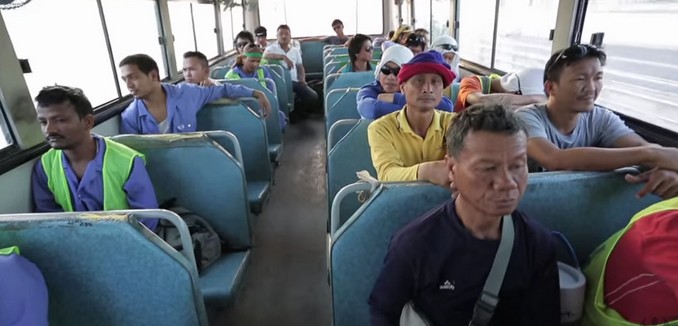FIFA, the governing body of international soccer, will investigate the arrests of a team of BBC reporters by Qatari authorities, The Washington Post reported Tuesday.
The controversy surrounding FIFA’s decision to award the 2022 World Cup to Qatar is showing no sign of letting up, but now at least, the world soccer governing body is promising to do something about it. On Monday, FIFA announced it would investigate why the Middle Eastern country arrested a BBC news crew, who was reporting on conditions of migrant workers building the tournament’s facilities.
“Any instance relating to an apparent restriction of press freedom is of concern to FIFA and will be looked into with the seriousness it deserves,” FIFA said in a statement …
The reporters, who were arrested Monday, were interrogated and jailed for two nights before being released. Their equipment, confiscated by Qatari officials, has not been returned.
One of the BBC journalists, Mark Lobel, wrote of the arrest.
We were invited to Qatar by the prime minister’s office to see new flagship accommodation for low-paid migrant workers in early May – but while gathering additional material for our report, we ended up being thrown into prison for doing our jobs. …
A dozen security officers frisked us in the street, shouting at us when we tried to talk. They took away our equipment and hard drives and drove us to their headquarters. …
It was meant to be the first day of our PR tour but instead we were later handcuffed and taken to be questioned for a second time, at the department of public prosecutions.
Thirteen hours of waiting around and questioning later, one of the interrogators snapped. “This is not Disneyland,” he barked. “You can’t stick your camera anywhere.”
Qatar has been stung by criticism from the likes of British Prime Minister David Cameron and the editors of The New York Times for the dangerous exploitation of migrant laborers to build the World Cup facilities. According to The Guardian, more than 180 migrants died working in Qatar in 2014.
In The Fruitful Game: How Qatar Uses Soccer to Polish its Image, which was published in the October 2014 issue of The Tower Magazine, associate editor Ben Cohen described the symbiotic relationship between cash-rich Qatar and money-guzzling FIFA.
In that sense, the success of the Qatari World Cup bid simply underlines the loose relationship that international sporting bodies have always had with moral standards. There is, however, an additional, critical factor to account for: even when compared to the glory days of the late twentieth century, when stars like Brazil’s Pelé and Argentina’s Diego Maradona strutted the pitch, soccer’s thirst for commercial investment has grown astronomically. State-of-the-art stadiums, super clubs fielding players earning seven-figure monthly wages, international television broadcast deals which ensure that a viewer in America can channel-hop between live games from Germany, Spain, and Italy (by turning, for example, to the Qatari-owned beIN television sports network)—all of this requires a significant injection of capital. And capital is something the oil-drenched Qataris have on tap, in marked contrast to the afflicted, cyclical economies of Europe and the United States. As Kuper pointed out in our conversation, Qatar is also willing to spend on vital FIFA projects that garner less media attention: “If you want to host a women’s World Cup, or an Under-20 World Cup, it costs money, but Qatar can help you out.”
By readily demonstrating their seemingly bottomless largesse, the Qataris help themselves out as well. Until the early part of this decade, it’s safe to say that most soccer fans rarely, if ever, gave thought to the tiny Persian Gulf monarchy that has been ruled by the al-Thani family since the middle of the nineteenth century. But in 2011, in an extraordinary public relations coup, the Qataris began a commercial relationship with FC Barcelona, the Catalan champions of the Spanish league, who were then at their masterly peak.
The Barcelona deal was an eyebrow-raising arrangement between a wealthy, conservative petrostate and a soccer club steeped in left-wing politics and Catalan nationalism—until the Qataris came along, Barcelona steadfastly refused commercial sponsorship of their shirts, displaying instead the logo of UNICEF, the United Nations Children’s Fund. Cannily, the Qataris opted to spend their $40 million annual sponsorship of Barcelona through the Qatar Foundation, ostensibly an educational and community organization created in 1995 by the then-Emir, Sheikh Hamad bin Khalifa al-Thani. Everybody won: Barcelona retained their illusory non-profit image while getting a serious injection of cash, and the Qataris reveled in a bonanza of positive publicity.As sports retailers happily fed the insatiable public appetite for child-size replica jerseys of Barcelona idols like Lionel Messi and Andres Iniesta, the Qatar Foundation, whose logo was emblazoned in generous letters on the front of the shirt, became globally recognized. In the process, Qatar’s external image transformed from that of a remote desert emirate, 94 percent of whose inhabitants are migrant workers denied the education and healthcare rights granted to Qatari citizens, into a powerhouse supporter of scientific and commercial research, whether through the Qatar Foundation or through the numerous universities, like Carnegie Mellon and Paris’s HEC business school, with campuses in Qatar. By 2013, the Qataris were so confident of their progress that they swapped out the Qatar Foundation logo on Barcelona’s shirt for that of Qatar Airways, with no objections on the part of the Barcelona management.
[Photo: The Guardian / YouTube ]




